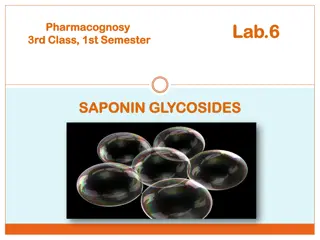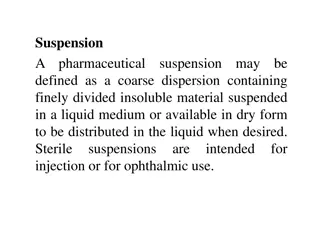Understanding Saponin Glycosides in Pharmacognosy: Properties and Applications
Saponin glycosides, found in various plants, are compounds with diverse benefits ranging from cholesterol regulation to potential anticancer properties. They form colloidal solutions in water and are used in soap manufacturing due to their unique properties. Additionally, saponins have bitter taste,
7 views • 18 slides
Understanding Emulsions in Pharmaceuticals
Emulsions are dispersions where small liquid globules are distributed in an immiscible vehicle. While many pharmaceutical products are emulsions, some may fall into different categories. There are two main types of emulsions: oil dispersed in water (O/W) and water dispersed in oil (W/O). Factors aff
1 views • 33 slides
Overview of Tannins: Composition, Chemistry, and Reactions
Tannins are complex organic substances found in various plant sources known for their astringent properties. They have therapeutic uses in medicines and commercial applications in industries like leather. Tannins form colloidal solutions, exhibit specific chemical reactions, and are classified into
2 views • 25 slides
Understanding Gypsum Products in Dentistry
Gypsum products play a crucial role in dentistry, serving as impression materials, die materials, and models. The classification of gypsum products includes impression plaster, model plaster, dental stone, and high-strength variations. The manufacturing process varies for dental plaster and stone, w
2 views • 41 slides
Understanding Colloidal Dispersions and Classification
In the realm of dispersed systems, molecular, colloidal, and coarse dispersions differ in size rather than composition. Colloidal dispersions consist of particles ranging from 1 nm to 1 micrometer, exhibiting unique characteristics and examples. The classification is also based on physical states an
1 views • 127 slides
Understanding Colloidal Dispersions in Physical Pharmacy
Colloidal dispersions consist of particulate matter distributed throughout a medium. They can be classified based on particle diameter, with molecular, colloidal, and coarse dispersions being common types. The enormous surface area of colloidal particles leads to unique properties, such as catalytic
1 views • 69 slides
Understanding Colloids and Their Importance in Pharmaceuticals
Colloids play a vital role in the pharmaceutical industry as heterogeneous biphasic systems with particle sizes ranging from 1nm to 100nm. They are classified based on aggregation and interaction of phases, with examples like aerosols, foams, emulsions, and more. Colloids can be prepared by condensa
0 views • 23 slides
Understanding Pharmaceutical Suspensions
A pharmaceutical suspension is a dispersion of finely divided insoluble material in a liquid medium, available in liquid or dry form. These suspensions are essential for unstable drugs and come in different particle sizes, from colloidal to coarse. The particles in a suspension vary in size, influen
1 views • 88 slides
Understanding Saponin Glycosides in Pharmacognosy: Properties and Applications
Saponin glycosides are plant compounds with diverse applications, from forming colloidal solutions to binding with cholesterol in the body. They possess bitter taste and detergent-like properties, offering benefits in health and industry. Learn about their structures, sources like Quillaia saponaria
3 views • 18 slides
Electric Properties of Colloids in Liquid Media: Charging Mechanisms and Electrokinetic Phenomena
Colloidal particles dispersed in liquid media can acquire a charge through selective adsorption of ionic species or ionization of surface groups. This leads to electrokinetic phenomena like electrophoresis, electro-osmosis, sedimentation potential, and streaming potential. The stability of colloids
2 views • 16 slides
Understanding Emulsions: Types, Factors, Tests, and Requirements
Emulsions are dispersions of liquid globules in a medium where they are immiscible. Learn about oil-in-water and water-in-oil emulsions, factors affecting emulsion types, identification tests, and requirements for creating stable emulsions.
0 views • 28 slides
Understanding Water Quality in Dairy Plants
Water quality plays a crucial role in dairy plant management. Impurities in water, including organic matter, dissolved gases, and mineral salts, can impact the overall quality. This article delves into the various aspects of water quality, such as dissolved and suspended matter, colloidal suspension
0 views • 14 slides
Pharmaceutical Suspensions: Definition, Formulation, and Applications
Pharmaceutical suspensions are dispersions of insoluble solid particles in a fluid medium, commonly aqueous. They offer benefits like increased drug stability, improved palatability, and ease of administration. Formulation considerations include homogeneity, re-suspension ability, particle size, and
1 views • 46 slides
Soil Chemistry and Mineralogy Analysis at CSU Summer Soil Institute
Explore the comprehensive analysis of soil chemistry, texture, and mineralogy conducted at the CSU Summer Soil Institute in July 2010. The study delves into pedology, elemental composition, particle size distribution, X-ray diffractometry, and mineralogical composition of various soil samples. Detai
0 views • 22 slides
Understanding Mixtures: Solutions, Colloidal Dispersions, and Suspensions
Food mixtures can be classified based on particle size distribution, with the dispersed phase scattered throughout a continuous medium. Solutions, a type of mixture, consist of a solute (dispersed phase) and a solvent (continuous phase), forming a homogenous blend. Factors like temperature, particle
0 views • 80 slides
Solutions and Colloidal Dispersions: Properties and Examples
Solutions and colloidal dispersions are mixtures essential in various processes, including food production. Understanding solubility, phases, and types of dispersions is crucial for food quality and stability. This content explores the properties of solutions, colloidal dispersions, and their existe
0 views • 15 slides
Analysis of Wage Rankings and Dispersions in Global Health Workforce
This study delves into the wage rankings, dispersions, and standardized wage levels of 16 health workforce occupational groups across 20 countries. The research objectives include exploring variations in occupations and countries concerning wage levels, dispersions, and rank-orders. Data collected f
0 views • 13 slides
Understanding Colloidal Systems in Food Products
Colloidal systems play a crucial role in providing structure, texture, and mouthfeel to various food products such as jam, ice cream, and mayonnaise. They are formed when one substance disperses through another without forming a solution, resulting in various types of colloids like gels, sols, emuls
0 views • 15 slides
Mastering Your Colloidal Silver Generator
Discover the future of wellness with biosilverstreamgen's Colloidal Silver Generators. Our cutting-edge technology ensures the purest and most effective colloidal silver solutions, empowering you to support your health naturally. Visit our website to
0 views • 11 slides


















